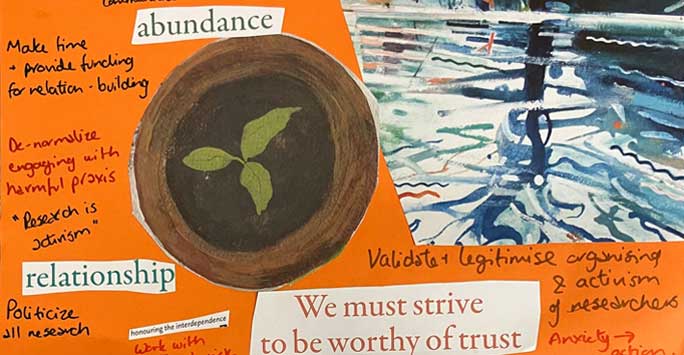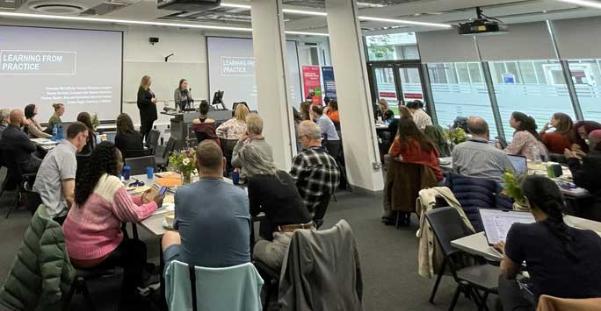
Anca Carter-Timofte reflects on their experiences at the recent event 'Ethics for Social Justice Research: Learning from Creative Approaches' event held in June 2025 at the University of Liverpool.
In June 2025 I was involved in organising a one-day workshop on Ethics for Social Justice Research at the University of Liverpool with an interdisciplinary team of colleagues from Politics, Law and History. The event aimed to encourage personal reflections on and discussions about processes of ethical review as well as ethical principles in research.
I attended the workshop with little knowledge of the formal ethics review process myself, as I have not yet experienced applying for ethical approval. In my own research, I focus on existing data that is readily available online, such as parliamentary debates and asylum legislation and so formal ethical review has not been required.
Yet, as a researcher in politics on migration studies, ethical considerations have formed a key part of deciding what research I undertake. Until the workshop, my knowledge of formal ethics review processes was largely limited to hearing from fellow PhD students about their experiences of applying. However, as I discovered on the day, this is only one aspect of what makes up ethical considerations in research.
The fact that attendees at the workshop participated from various expertise, including academic, practice-based and lived experience made the discussions on the day rich in variety, and made the sharing of experiences especially important. In fact, the researcher’s own experiences and positionality became a central point of discussions throughout the day.
This came across during a session on ‘navigating ethics challenges’, where attendees were encouraged to share what their biggest ethical challenges in the context of research have been and how they were able to overcome this.
Becoming emotionally invested in research
One issue which resonated with several people was the idea of becoming emotionally invested in the research, and how to balance this with your position as the researcher. In some cases, researchers wanted to be able to maintain a relationship with their research participants after the research was undertaken. This was a view taken by Professor Phil Scraton, from Queen’s University Belfast, who highlighted potential ethical issues when researchers are quick to terminate the relationship with the people they have been engaging with as part of their research.
There were conflicting responses to this question. Some participants highlighted the need to maintain separation between researcher and the participant to maintain objectivity and ensure the safety of the researcher, whilst others argued that researchers can hardly ever be objective and have a moral obligation towards participants. This begs the question of when and where does your relationship with those you are researching end and interrogates current ethical understandings of what the boundaries between researchers and participants should be.
Discussions of positionality continued into the afternoon, during both the panel on ‘Learning from Practice’ which focused on principles for socially-engaged and co-productive research and the subsequent creative collaging workshop. Firstly, the panel discussions highlighted that the ethics process could be improved by bringing more cultural awareness to the process.
Again, positionality and personal experience can come into play here, where a researcher may be able to use their own experience or cultural knowledge to tailor the ethics for their research. This was an issue which Diane Garrison, from Liverpool John Moores University, brought to attention. Diane highlighted how the western ethics process can have incompatibilities with non-western cultures and traditions, often putting researchers from western institutions in a position where they are unable to change or edit the ethics applications to fit better with the situation they are researching. There is scope to bring more cultural awareness into the ethics process, and to allow researchers to engage more with this.

Participants at the ethics for social justice workshop
Creativity and wellbeing in research
Positionality and the researcher’s personal experiences came through most clearly in the final part of the day, which involved a creative collaging workshop. Participants were given a variety of collaging materials, including found materials from old magazines, postcards, paper and other ephemera, and asked what they would like to see in an ethics framework for socially-engaged and co-productive research.
The creative nature of this activity meant that participants were able to spend time reflecting on how to translate their responses visually. Many participants talked about their personal experiences as a starting point, selecting images and colours as representations of ethics issues that they have faced in their research.
A theme that came across from multiple participants was the importance of ensuring the well-being of research participants as the driving principles of ethics frameworks. Alongside this, many people found ways to visualise and express hopeful sentiments about ethics frameworks. Whilst participants drew attention to issues within formal ethics review processes for research throughout the day, many people expressed hope that these issues can be addressed.
Having started the day with little knowledge of the ethics process, I am now aware of how ethics is a complex and varied issue, and why workshops such as this are so important for researchers to come together to share and be exposed to differing viewpoints.
Attendees were encouraged to share their experiences but were also receptive to and encouraging of the differing perspective and ideas which appeared throughout the day. This open and collaborative approach to ethics is something that I and other attendees will take from this event and will hopefully shape our continued discussions of and approaches to ethics in research.
Image credits
With thanks to workshop participants including Abi Deivanayagam whose collage features in this post. This contains found materials including fragments of work published in Resurgence and Ecologist. Relevant fragments/source images have been reproduced here with kind permission of Rachel Grant Art (http://site.rachel-grant.com/home.html) and David Wiseman (https://www.davidwiseman.org.uk/). We have endeavoured to identify any large portions of works reproduced here and seek permissions to use these. If you believe an element of your work has been reproduced here without permission and you would like to raise this, please get in touch by emailing: w.asquith@liverpool.ac.uk